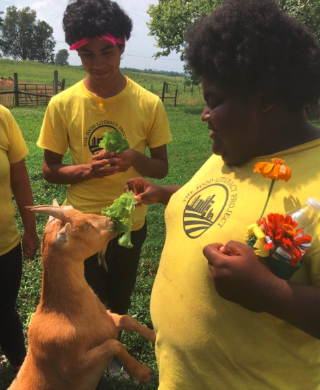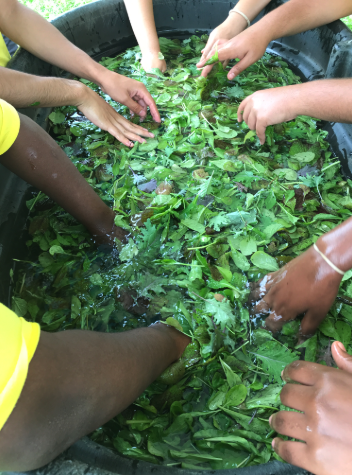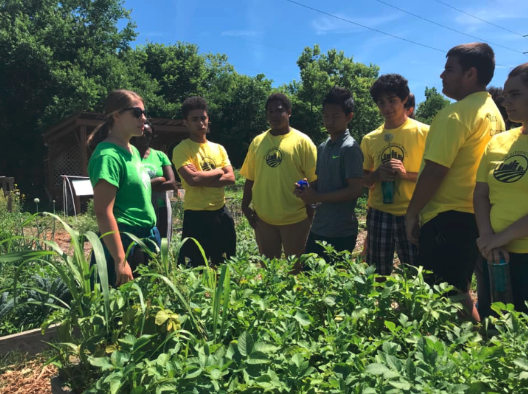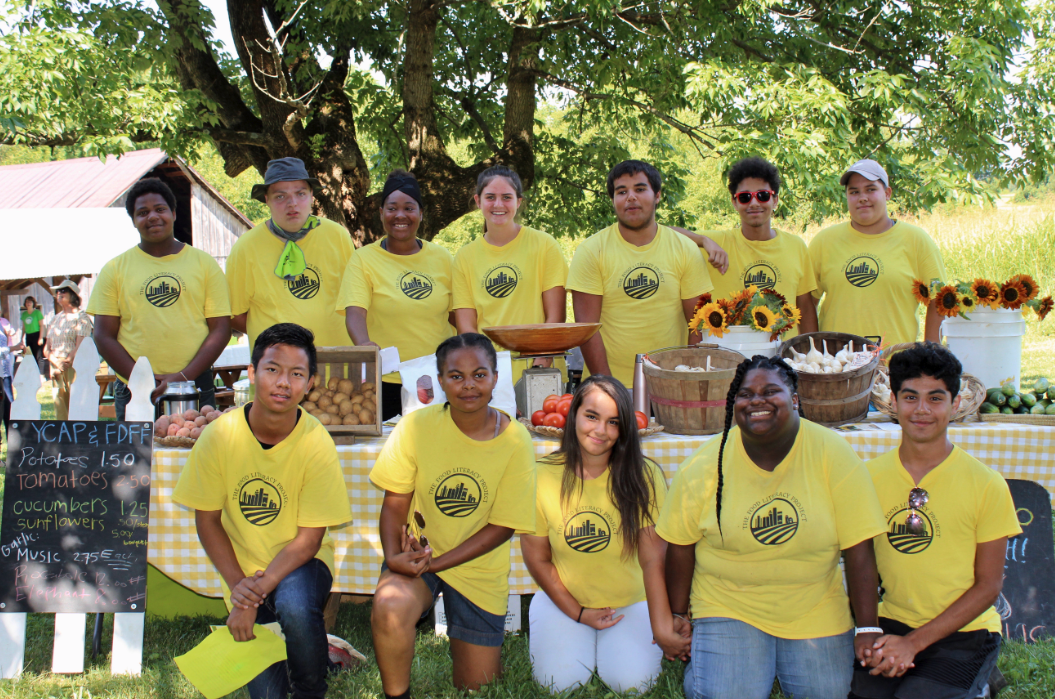Food Literacy Project Emphasizes Hands-On Farm-Based Experiences For Students
 Photography Provided
Photography Provided
My great-grandparents tended a huge fruit and vegetable garden on their property, as did my grandparents. Oh, how I loved visiting Grandma’s house so I could plop myself down in the middle of her strawberry patch and gobble down scads of red ripe berries. But my parents didn’t plant a garden, nor did I.
“It seems that every generation is a little bit more removed from the land,” says Carol Gunderson, Executive Director of the Food Literacy Project. It’s a sad but true statement and one that others took note of, too. In fact, that’s how the Food Literacy Project came to be.
Back in 2006, an area farmer noticed that a good number of children hadn’t a clue where their food came from so he thought how great it would be if there was a program where kids and teens could have an authentic, hands-on experience working on a vegetable farm. The Food Literacy Project began as a pilot at Oxmoor Farms, and it was clear that local youth really enjoyed the field-to-fork experience.
“We consider it an invitation to participate meaningfully in a local food system. This is why we’ve tried to shy away from giving tours or too much information,” Gunderson says. “We let the experience be the driver of the education because we know, through research, that people are more likely to have a life-changing encounter if the learning is active rather than passive.”
Gunderson maintains that it’s not so important that kids recall the names of all vegetables as it is for them to recognize the veggies in a meaningful manner — i.e., the crunch of the radish or the bitter taste of arugula.
The organization’s mission revolves around youth transforming their communities through food, farming and the land. So much of their work involves grade-school children learning to plant, harvest and cook together.
“We have an outdoor classroom on a working vegetable farm so they’re engaging all of their senses by growing, harvesting and preparing healthy food together,” Gunderson says. “It really gives kids a positive experience with a vegetable, which truly an extraordinary number of people have never had.”
Gunderson stresses that it’s a totally different experience to participate in harvesting something and preparing a dish from scratch than simply having peas show up on your plate. With field-to-fork, students have investment in what they are eating and they get to cook it in the outdoor kitchen.
“They decide what goes in the dish — maybe more kale and less mustard greens,” Gunderson says. “They get to have ownership over the recipe because it’s their creation.”
Teens, ages 16 to 19, can apply to join the Youth Community Agriculture Program (YCAG) where they engage in the work of farming and selling produce at local farmers markets. This year they have a crew of 15 youth working 30 hours a week in the summer program.
“This is where teens really do a deep dive into the food system,” says Gunderson, noting that lecturing kids to eat their vegetables because they should is a tough sell with kids of all ages — teens, in particular. However, once these teens are exposed to working a garden with their hands, their perspective shifts.
Gunderson vividly recalls a time when the teens were preparing to take their veggies to the farmers market.
“We were making signs for the market and discussing the selling points of our vegetables,” Gunderson says. “I remarked, ‘Oh, our carrots are rich in vitamin A,’ and the kids were like, ‘No, Miss Carol. It’s not about the nutritional properties of this food. People will buy the vegetables because they taste good.”
 Another aspect of the Food Literacy Project is the professional development they offer to educators who have gardens on school grounds.
Another aspect of the Food Literacy Project is the professional development they offer to educators who have gardens on school grounds.
“We help teachers understand how to utilize gardens during the school day,” Gunderson says.
They also partner with food service workers and cafeteria managers to help them think creatively about how to get kids interested in fresh, local food.
The Food Literacy Project works with families, too, as there are neighborhoods in Louisville where people have physical and economic barriers to accessing healthy food.
“We’ve found that kids can be the drivers of change in their own families and peer groups,” Gunderson adds. “It’s like how I learned about recycling at school and came home and taught my family. I see that happening with food. If kids can bring home these messages, recipes and fresh food, they can be the change in their own household.”
They also send a truck farm into the community as an outreach — taking the farm to the community rather than bringing the community to the farm.
“It’s an edible mobile learning garden — literally a garden planted right in the bed of a pick-up truck,” Gunderson says.
In addition, they’re starting a second living classroom at Iroquois Farm, an urban farm on the south end of town. It’s an endeavor that the students have been instrumental in launching.
“To see people from so many different backgrounds come together for a common goal to clear a weed patch or to cook a meal together is amazing,” says Maggie “Mushroom” Epperson, a two-year YCAP participant.
As students become one with their food, it has a positive effect on their relationship with and appreciation for nutrition.
“Choosing to eat fresh and healthy because it tastes great is a good place to start, but pretty quickly teens, especially, discover that their bodies feel better when they eat differently,” Gunderson says.
For instance, they are less lethargic and have more energy.
The program also teaches students leadership and team-working skills. Denaee “Dragonfruit” Trumbo, a senior at Iroquois High School, says, “With farming, there’s so much to do [that] you can’t do it alone so you have to learn to get along with people and work as a team.”
 For some, the program serves to inspire an entire career. Such was the case for Epperson, who recently finished her first year in the Culinary Nutrition program at Johnson and Wales University in Providence, Rhode Island. Epperson credits YCAP for breeding her interest in pursuing culinary school.
For some, the program serves to inspire an entire career. Such was the case for Epperson, who recently finished her first year in the Culinary Nutrition program at Johnson and Wales University in Providence, Rhode Island. Epperson credits YCAP for breeding her interest in pursuing culinary school.
“YCAP has fostered in me a curiosity about how the food system works,” Epperson says. “I gained a true appreciation for the way that food is grown.”
Gunderson, who has been with the program for 13 years, says she never tires of witnessing the children’s sense of wonder.
“I love seeing that spark of recognition when a kid, who hasn’t had much exposure to being on a farm, has an experience that they can connect back to their lives,” Gunderson says. “For instance, when they smell herbs in the garden and a light bulb goes off in recognition and someone yells, ‘pizza!’ That moment never gets old.”
She was also bursting with pride when a 21-year-old former student who had participated in the program since he was 13 called to say that he had won a fellowship through the Safe & Healthy Neighborhoods. It was a leadership opportunity for young African-American men.
“He said that the Food Literacy Project played a part in him getting where he is in life and he wanted to know if he could bring a cohort out to the farm,” Gunderson says. “I can’t think of anything more rewarding.”
The Food Literacy Project’s office is at 9001 Limehouse Lane in Louisville. For more information, call 502-491-0072 or visit foodliteracyproject.org






Comments 1